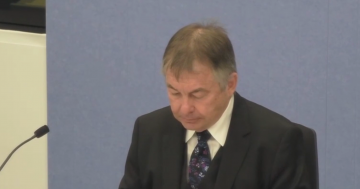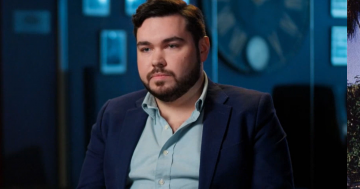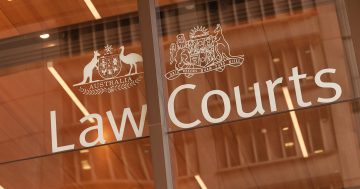
Brittany Higgins and Bruce Lehrmann: we are no closer to the truth of the matter. Photos: Albert McKnight.
What a mess. Last week’s sitting of federal parliament started with the Coalition going after ACT Senator Katy Gallagher, running with the ball passed to them by their News Corp cheerleaders, and finished with it having to deal with accusations of sexual misconduct in its own ranks.
An unedifying distraction from business that the public has far more concerns about – climate change, housing, interest rates, the cost of living and a looming recession – the tawdry events show the Brittany Higgins rape accusation in Parliament House still has a long way to play out.
Years after the event, we are no closer to the truth about what actually happened, and may never know. After an aborted trial, no finding has been made against the man Ms Higginns accused, her former colleague Bruce Lehrmann.
What can be said is that media advisers should not believe their own spin and think that in a criminal matter they can prosecute their own case through a movement and friendly journalists.
It was inevitable that there would be blowback in the form of anti-woke journalists alarmed at the trashing of the presumption of innocence being fed enough material to run a concurrent defence as Mr Lehrmann’s trial proceeded.
In fact, there were two trials – one in the court and one in the media – divided almost down the tribal lines of our fractured media.
The trial fiasco, the inquiry that followed, the defamation cases and the selected publishing of leaked phone messages, audio, and Ms Higgins’ compensation payout leave hardly anyone untarnished.
They point to a broader social war being fought where the combatants are all claiming the higher ground but end up bloodied and muddied.
Belief in a fair and unbiased justice system has been eroded. However, in matters of sexual assault, it already had plenty of critics, particularly the way defence barristers attempt to destroy the credibility of complainants.
The reputation of the ACT DPP has been damaged, as it appears Shane Drumgold may have overreached, perhaps caught up in the fervour of the situation and a belief that the police were not sufficiently investigating and then arresting enough sexual assault perpetrators.
The trial revealed a distrust between the DPP and the police that, in the interests of justice, cannot stand.
Police behaviour during the investigation and the trial has been questioned, particularly a closeness to the defence.
Nobody knows how or who leaked evidence and material that should not have been made public to selected media, but the police are among those who could have.
Journalists/commentators who have been loudest about protecting the sanctity of the justice system and the purity of trials have been all too happy to publish leaked material and draw their own conclusions, especially if they could turn the tables on the Labor Government, which in opposition had grilled the Coalition about the alleged rape in a Minister’s office and the aftermath.
Last week the stories moved quickly from allegations – of misleading parliament about when Labor knew about Ms Higgins’s rape allegation and weaponising it to attack the Coalition – to reporting it as fact.
But by the end of the week, the murkiness of the situation was all too apparent and the risks for all parties too high.
As noted before, the saga still has more to run, especially with the remaining Lehrmann defamation cases – it is important to note that News Corp settled the claim against it early in the piece – and investigations into the leaks are underway.
But there are lessons so far.
Police need to do more to convince sexual assault complainants to come forward immediately, that their claims will be investigated fully, and that they will not be hostile to those who don’t due to shock, shame or fear that they won’t be believed.
Cases should not go to trial without sufficient evidence, and they should not be run in the media.
Ms Higgins’ decision to go to the media before Mr Lehmann has even been charged set the tone for a contaminated process that has been disastrous for the cause of justice.
The media needs to reevaluate its role, the decisions they have made and assess whether they have really been in the public interest because this has set Australia on a path towards a sensationalist US-style approach to reporting high-profile court cases where media manipulation is rife and journalists are players, not observers.
The politicians need to get their House in order, reassess their priorities, and realise that the public is sick of them treating politics as a blood sport.





















